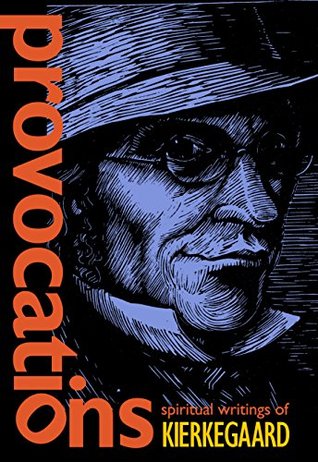More on this book
Kindle Notes & Highlights
Started reading
November 7, 2018
Part of the human predicament was that we are all interested in far too many things and thus are not decidedly committed to any one thing.
Genuine Christianity, according to Kierkegaard, is anything but doctrine. It is a way of being in the truth before God by following Jesus in self-denial, sacrifice, suffering, and by seeking a primitive relationship with God. Unfortunately, doctrine is what people want. And the reason for this is “because doctrine is the indolence of aping and mimicking for the learner, and doctrine is the way to power for the teacher, and doctrine collects people.”
An old man who himself was extremely melancholy gets a son in his old age who inherits all this melancholy – but who also has a mental-spiritual elasticity enabling him to hide his melancholy. Furthermore, because he is essentially and eminently healthy of mind and spirit, his melancholy cannot dominate him, but neither is he able to throw it off; at best he manages to endure it.
Kierkegaard sought to beguile his reader into the truth. His strategy was one of “entrapment” – to surround the reader with the alternatives before him, put them in contradiction to each other, and then help him see the many false ultimates by which people live their lives.
“In the splendid palace chapel a stately court preacher, the cultivated public’s elite, advances before an elite circle of fashionable and cultivated people and preaches emotionally on the text of the Apostle, ‘God chose the lowly and despised’ – and nobody laughs!” “This is the falsification of which official Christianity is guilty: it does not make known the Christian requirement – perhaps because it is afraid people would shudder to see at what a distance from it we are living.”
“Most systematizers stand in the same relation to their systems as the man who builds a great castle and lives in an adjoining shack; they do not live in their great systematic structure. But in spiritual matters this will always be a crucial objection. Metaphorically speaking, a person’s ideas must be the building he lives in – otherwise there is something terribly wrong.”
The aesthetic life is life immediately lived – a life lived for “the moment.” It is the lifestyle in which people are absorbed in satisfying their “natural” desires and impulses, whether physical, emotional, or intellectual. These people are solely concerned with their own happiness and believe that the key to happiness is found in externals – who they know, what they do, the roles they play, what they possess, where they live, and so on. They live for enjoyment, on the surface of life.
They are observers, spectators, tasters, but not serious participants.
The aesthetic life is certainly not restricted to the senses. Kierkegaard also criticizes the philosopher who is solely concerned with ideas – intellectual systems that leave the thinker unchanged, with no reason to choose this or that.
The speculative thinker makes Christianity into theology, instead of recognizing that a living relationship to Christ involves passion, struggle, decision, personal appropriation, and inner transformation.
Such a life recognizes that within the soul there is something (i.e. the eternal) that cannot be satisfied by a sensory life. Hence the realization of enduring values – justice, freedom, peace, love – and respect for the moral law within propel the ethical self forward into a life of responsibility, of caring beyond one’s own immediate interests. Herein lies true freedom: the ability to fulfill one’s duty, to move from what is to what ought to be.
The ethical involves both choice and resolution. It also involves struggle, because the realization of ethical values takes effort and time. Therefore an authentic, fully realized individual is one who is unified from within, whose actions are one, and who accepts responsibility for his commitments. Unlike someone who lives at the aesthetic level, the ethical individual is not swayed by his every emotion or by the opinions of others.
The religious person strives to allow himself to be transformed by God. Such transformation includes three things: (1) Infinite resignation – dying to the world, the willingness to sacrifice any finite good for the sake of God. (2) Suffering – undergoing a transformation
the self, though not by the self. It is the process of undergoing “self-annihilation” so that God, not self, can do his transforming work. (3) Guilt – the feeling of one’s inability to give oneself completely, unreservedly, to God.
Thus Kierkegaard says: “An ethic which ignores sin is an absolutely idle science.” Allowing oneself to be transformed by God is, in short, more important than fulfilling one’s duty.
Kierkegaard expends great efforts contrasting objective thinking and subjective truth. For him, faith is not a belief but a certain way of being in the truth that extends beyond reason’s ability to grasp.
To him subjectivity means turning away from the objective realm of facts – that can be learned by detached observation and abstract thinking – and immersing oneself in the subjective, inward activity of discovering truth for oneself. At its highest pitch, subjectivity culminates in faith – an infinite passion that is both rationally uncertain and paradoxical. Faith requires risk, which objective certainty abhors. But this is the distinctive mark of Christian faith. Faith means to wager everything and to suffer for the truth, despite the offenses of the Incarnation and the Cross.


